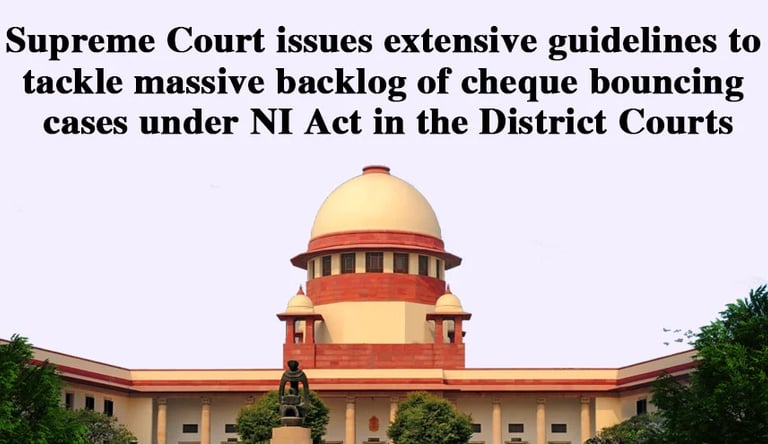AdVocate harshit Sachar | chamber no: 617 | district courts ludhiana | 2817 gurdev nagar ludhiana | ✆+91 7889228369
Supreme Court Issues Guidelines to Streamline Cheque Bounce Cases under Section 138 NI Act
The Supreme Court on 27 September 2025 laid down fresh guidelines to ensure speedy and effective disposal of cheque bounce cases under Section 138 of the Negotiable Instruments Act.The Supreme Court on 27 September 2025 laid down fresh guidelines to ensure speedy and effective disposal of cheque bounce cases under Section 138 of the Negotiable Instruments Act.
CIVIL LAWSCOMMERCIAL CASE LAWCHEQUE BOUNCE
Advocate Harshit Sachar Ludhiana
10/4/20252 min read


Supreme Court Guidelines on Cheque Bounce Cases (27 September 2025)
Cheque bounce cases under Section 138 of the Negotiable Instruments Act (NI Act), 1881 form one of the largest categories of litigation in Indian courts. Recognizing the massive backlog and procedural hurdles, the Supreme Court of India on 27 September 2025 (via SCC Online) issued important guidelines to streamline these cases, particularly in District Courts.
The Court observed that while Section 138 was enacted to uphold the credibility of cheques in commercial transactions, procedural delays have diluted its purpose. The judgment emphasized that Section 138 proceedings should not be viewed merely as punitive but should reinforce confidence in banking transactions.
Key Guidelines Issued by the Supreme Court:
Efficient Service of Summons
District Courts must adopt modern methods such as email, WhatsApp, and SMS for speedy service of summons in cheque bounce cases.
If physical service fails, electronic service will be deemed valid.
Clubbed Hearings for Multiple Cheques
If several cheques are issued in a single transaction and dishonoured, courts should club hearings together to avoid repetitive trials.
Encouraging Mediation & Settlement
Courts must actively encourage parties to explore mediation and compromise, especially at the pre-trial stage, to reduce unnecessary litigation.
Evidence Recording by Affidavit
To save judicial time, complainant evidence can be recorded by affidavit unless cross-examination is specifically required.
Fixed Timelines for Proceedings
District Courts must ensure strict timelines for each stage of a Section 138 trial—summons, evidence, arguments, and judgment—so that cases are concluded within the statutory period.
Why This Judgment Matters
For Businesses: Provides faster resolution of cheque dishonour disputes, improving business confidence.
For Courts: Reduces burden on already overworked District Courts.
For Individuals: Ensures fairness by encouraging mediation before long trials.
By issuing these guidelines, the Supreme Court has reiterated that cheques must remain reliable instruments of commerce, and courts must facilitate speedy enforcement of rights arising from them.
FAQs on Cheque Bounce Cases
Q1. What is Section 138 of the NI Act?
Section 138 deals with the dishonour of cheques due to insufficient funds or other reasons. It makes cheque dishonour a criminal offence, punishable with imprisonment or fine.
Q2. Can a cheque bounce case be settled outside court?
Yes. Courts encourage parties to settle through compounding or mediation at any stage of proceedings.
Q3. What happens if multiple cheques bounce in one transaction?
As per the Supreme Court’s guidelines (27 Sept 2025), such cases should be clubbed together to avoid multiplicity of proceedings.
Q4. Is personal presence of the complainant mandatory?
Not always. The Court clarified that evidence by affidavit is permissible, reducing the complainant’s repeated personal appearances.
Q5. Why did the Supreme Court issue new guidelines now?
Because cheque bounce cases form a significant portion of India’s criminal docket, and procedural delays were undermining the purpose of the law.
Disclaimer:
This blog is for informational purposes only and does not constitute legal advice. Readers are encouraged to seek professional legal consultation for their specific matters. While every effort has been made to ensure accuracy, there may be inadvertent errors or updates in law after publication.
Services
Sachar Law Firm – Advocate, Lawyer, Attorney & Solicitor Services in India | Ludhiana, Punjab.
Expert legal advice across various practice areas - Civil, Criminal, Divorce and Matrimonial, Consumer and Corporate laws, Bail Matters, Property Contract Disputes, Insurance claim disputes, cyber Crime cases, Cheque bounce, Family Divisions, Arbitration. Bail Matters, Electricity Board Cases, Appeals before Session court Ludhiana, Marriage certificate, Court Marriage, Succession Certificate Accident Claim (MACT), NRI Legal Matters, NRI Property Matters.
“Get in Touch with Sachar Law Firm”
Quick Links
© 2025. All rights reserved.
Advocate Harshit SACHAR
Legal Blog
2817, 1st Floor , Gurdev Nagar, Ludhiana, Punjab -141001
Address: Office Cum Res:
Corporate Liquidation and Recovery Litigation
☎️ 0161 7965410
